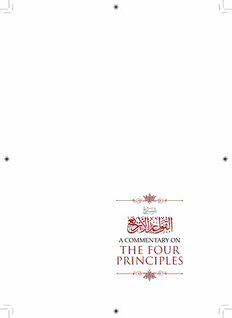
A Commentary on the Four Principles, A Comparison between Shirk Beliefs and Practices of the Past and Present PDF
Preview A Commentary on the Four Principles, A Comparison between Shirk Beliefs and Practices of the Past and Present
A COMMENTARY ON THE FOUR PRINCIPLES A COMMENTARY ON THE FOUR PRINCIPLES A Comparison between Shirki Beliefs and Practices of the Past and Present Shaykh al-Islam Muhammad bin Sulaymaan at-Tameemi Commentary by ‘Abd ar-Rahmaan ibn ‘Abd al-Muhsin ibn ‘Abd al-Lateef Aal ash-Shaykh Translated by Nasiruddin al-Khattab © ???????????????????????, 2020 King Fahd National Library Cataloging-in-Publication Data Salah bin Muhammad Al-Budair ???????????????./??????????????>>>Riyadh , 2017 500 p: 17cm X 24 cm ISBN: 978-603-500-???-? ??????????????? I-Title ???.??? dc 14??/9??? L.D. no. 14??/???? ISBN: 978-603-500-???-? Contents Foreword by Shaykh Saalih ibn Fawzaan al-Fawzaan Foreword by Shaykh Saalih ibn ‘Abd al-Azeez ibn Muhammad Aal ash- Shaykh Commentator’s Foreword Author’s Foreword The first principle The second principle The third principle The fourth principle The Four Principles Bibliography A Commentary on The Four Principles Foreword by Shaykh Saalih ibn Fawzaan al-Fawzaan 6 A Commentary on The Four Principles Foreword by His Excellency Shaykh Saalih ibn Fawzaan al-Fawzaan In the name of Allah, the Most Beneficent, the Most Merciful I have read through the books Sharh al-Qawaa‘id al-Arba‘ and Sharh Thalaat al-Usool wa Adillatuha, which are commentaries on the books by Shaykh Muhammad ibn ‘Abd al-Wahhaab (may Allah have mercy on him) with a commentary by ‘Abd ar-Rahmaan ibn ‘Abd al-Muhsin ibn ‘Abd al-Lateef Aal ash-Shaykh, and I have found these two books to be very useful, because of the ideas contained in them and their novel approach. May Allah grant him the best of rewards and benefit others by means of his knowledge. Saalih ibn Fawzaan al-Fawzaan Member of the Committee of Senior Scholars, and Member of the Permanent Committee 1/5/1439 AH 7 A Commentary on The Four Principles Foreword by Shaykh Saalih ibn ‘Abd al-‘Azeez ibn Muhammad Aal ash-Shaykh 8 A Commentary on The Four Principles Foreword by His Excellency the Minister Shaykh Saalih ibn ‘Abd al-‘Azeez ibn Muhammad Aal ash-Shaykh Praise be to Allah, Lord of the Worlds, and blessings and peace be upon our Prophet Muhammad, and upon all his family and companions. To proceed: I have read through these two beneficial books which were written by Shaykh ‘Abd ar-Rahmaan ibn ‘Abd al-Muhsin Aal ash-Shaykh, namely Sharh Thalaathat al-Usool and Sharh al-Qawaa‘id al-Arba‘. It seems that the author – may Allah bless his work – put a great deal of effort into explaining the phrases of these two great books, which were written by the imam and mujaddid, Shaykh al-Islam Muhammad ibn ‘Abd al- Wahhaab (may Allah have mercy on him). He has done his utmost to make his commentary readily understandable by ordinary readers, so as to make accessible what these two texts, Thalaathat al-Usool and al- Qawaa‘id al-Arba‘, contain of the meanings of Tawheed and important Islamic concepts. May Allah reward the author, Shaykh ‘Abd ar-Rahmaan ibn ‘Abd al- Muhsin Aal ash-Shaykh, and increase him in knowledge, and make these two books of benefit to the Muslims. May Allah send blessings and peace upon our Prophet Muhammad, and upon his family and companions. Minister for Islamic Affairs, Da‘wah and Irshaad Saalih ibn ‘Abd al-‘Azeez ibn Muhammad Aal ash-Shaykh 9 A Commentary on The Four Principles In the name of Allah, the Most Beneficent, the Most Merciful Introduction All praise be to Allah, we praise Him and seek His help and forgiveness. We seek refuge with Allah from the evils of our own selves and from our bad deeds. Whomever Allah guides, none can lead astray, and whomever He leaves astray, none can guide. I bear witness that none has the right to be worshipped but Allah alone, with no partner or associate, and I bear witness that Muhammad is His slave and His Messenger, blessings and peace be upon him and all his family and companions. To proceed: What we have before us is an important essay, namely al-Qawaa‘id al- Arba‘ by the imam and mujaddid, Muhammad ibn ‘Abd al-Wahhaab (may Allah have mercy on him). This essay is important for many reasons, including: 1. The fact that it is a brief text Because the seeker of knowledge – at the beginning of his quest – must start with short texts, then gradually move on to longer texts, so that he will be able to decipher their phrases and learn the subtleties and knowledge contained therein. We have many examples of this approach among the righteous early generations. It was narrated that Yoonus ibn Yazeed said: Ibn Shihaab said to me: O Yoonus, do not start with difficult issues of knowledge, because knowledge has many valleys, and whichever valley you choose to go through, you will be cut off before you reach the end of it. Rather learn knowledge over time, and do not try to learn everything all at once, for whoever tries to learn everything all at once will lose everything altogether. Rather learn little by little, with the passage of time.1 1 Jaami‘ Bayaan al-‘Ilm wa Fadlihi by al-Haafiz Ibn ‘Abd al-Barr, 1/431. 10
